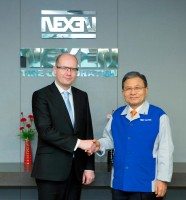Mid-range tyre brands benefitting from careless van drivers
Total volumes of car and van tyres fitted to company vehicles are expected to remain steady in 2015, however a subtle shift in consumption is taking place. This is the word from Kwik Fit, which says it is witnessing a rise in the ratio of van tyres being fitted. The company says there are several reasons why fleet van tyre consumption is going up while passenger car tyre fitments are declining. And it is seeing a second development within the growing fleet van tyre business – an increasing number of fitments are mid-range tyres, a trend driven by the high proportion of damaged tyres being replaced.
Kwik Fit fleet director Peter Lambert says the UK market leader has fitted a broadly constant overall volume of new tyres to company cars and vans in recent years, and he forecasts little change in the figure for this year: “While Kwik Fit’s overall volume of fleet tyre replacement business will remain largely static, we are witnessing changes in the shape of the market. Van tyre consumption as an overall share of our fleet business is rising, while company car tyre consumption is contracting.”
Ever more vans are joining the UK parc, growth partially attributable to the rise in online shopping and home deliveries. Downsizing from larger vehicles to vans and decisions to lease rather than buy also add to this growth in van numbers, while a greater focus on at-work driving safety means tyres are being more rigorously examined for wear and defects.
Meanwhile, tyre consumption by company cars is declining as companies, under pressure to trim costs and reduce their carbon footprint, are encouraging employees to opt for alternatives to car travel, such as teleconferencing and public transport. In addition, more people are participating in salary sacrifice programmes and clocking up lower miles that they would in traditional company cars. Telematics are also playing a role in changing company car driver behaviour.
Average tyre consumption across Kwik Fit’s fleet customers is approximately 1.85 tyres per vehicle per year, however in practice replacement varies enormously with some light commercial vehicle fleets fitted with as many as five new tyres per year. Company car replacement tyre authorisation is almost exclusively on a like-for-like basis and that means up to 95 per cent of models are fitted with premium brand tyres such as Michelin, Goodyear, Pirelli, Continental and Bridgestone. In contrast, while many van fleet operators continue to opt for premium brand tyres there is a growing trend towards mid-range replacement tyre policies.
Mid-range tyres currently account for half the replacement tyres fitted to fleet vans. “The majority of van tyres are replaced due to damage rather than wear. That is unlike the vast majority of company cars where 80 per cent of tyres replaced are due to wear,” shares Lambert. “As fleets are not always getting maximum benefit from their investment in premium brand tyres, managers are choosing to limit their cost exposure and opting to fit a higher percentage of mid-range tyres to vans.”
Approximately ten tyre sizes account for 80 per cent of the light commercial vehicle market, therefore Kwik Fit is changing the stock profile across its more than 600 centres to reflect changing fleet trends. This means growing number of mid-range tyres are entering branch inventories.
Although this year is expected to mirror 2014 in many ways, Lambert notes that the upcoming election’s outcome could lead to unexpected changes: “We expect the trends that we have witnessed in recent times continuing in 2015, although much will depend on the outcome of the May 7 general election. The newly-elected government will be determined to raise revenue from whatever sources it can, while continuing to cope with significant public sector funding shortfall. As the new government seeks to balance the books, future changes in taxation could have an impact on vehicle use and therefore tyre replacement.”




Comments